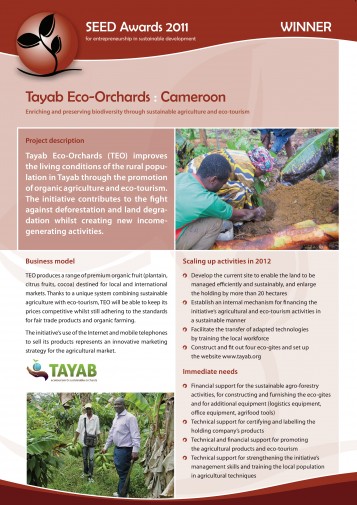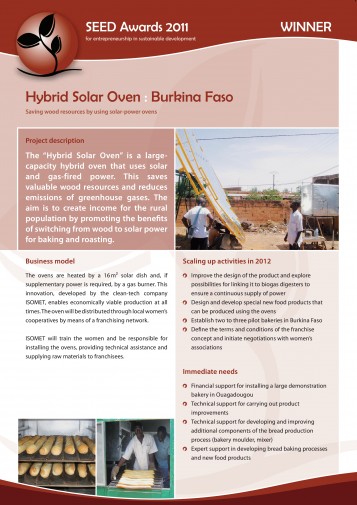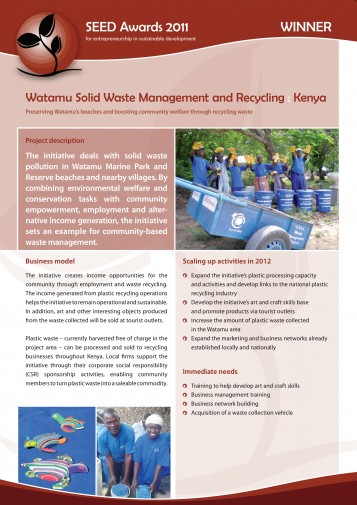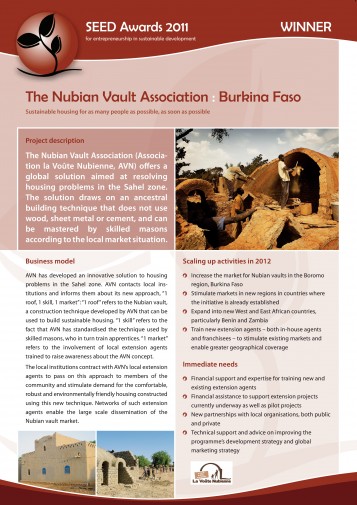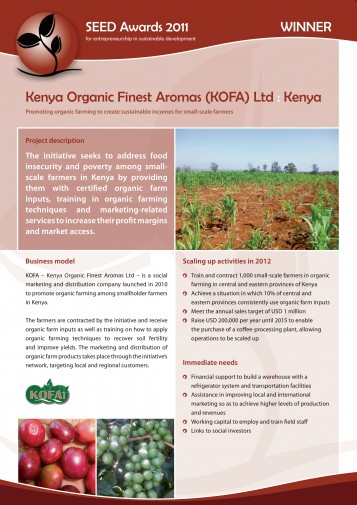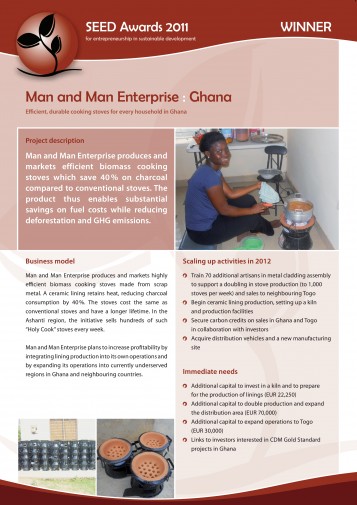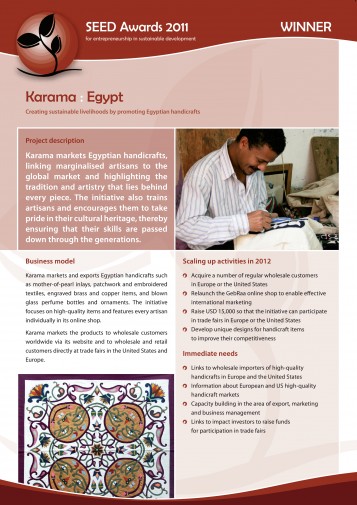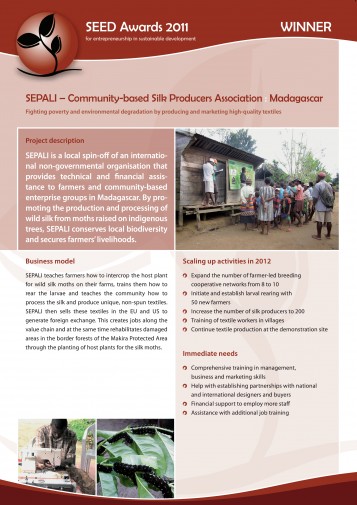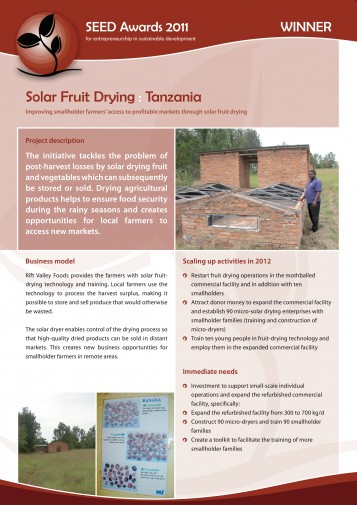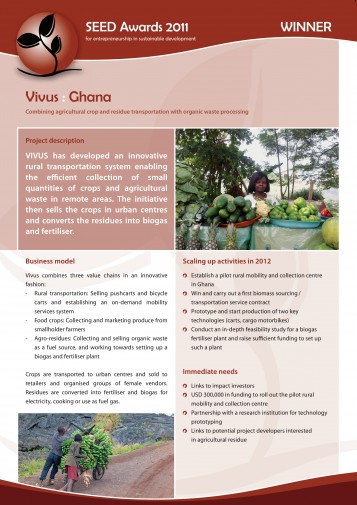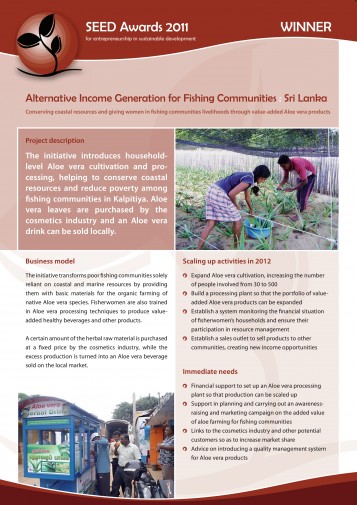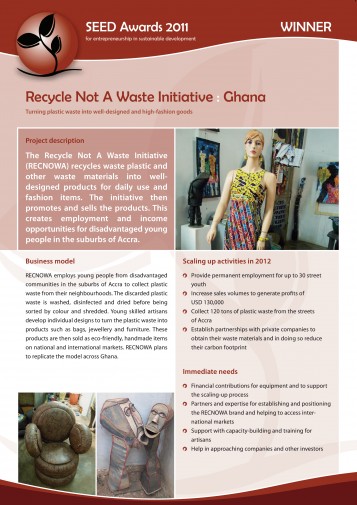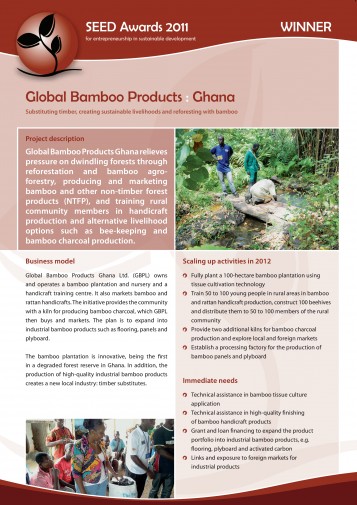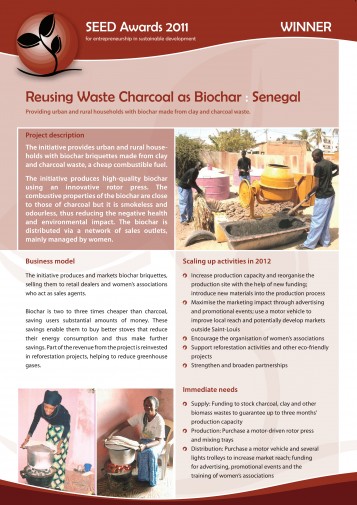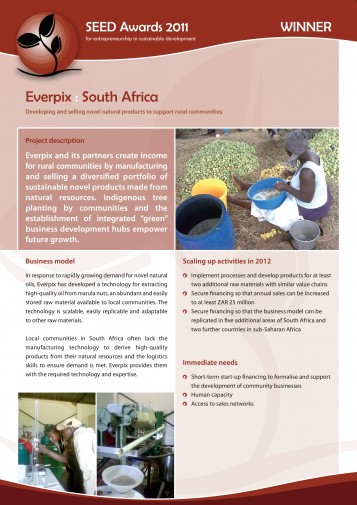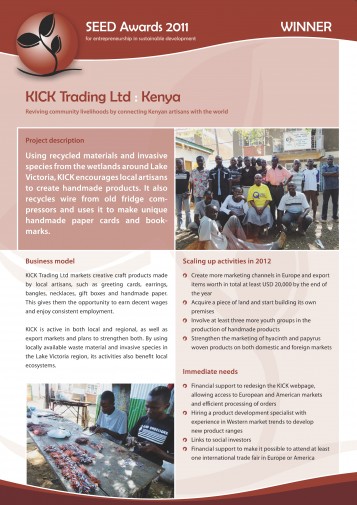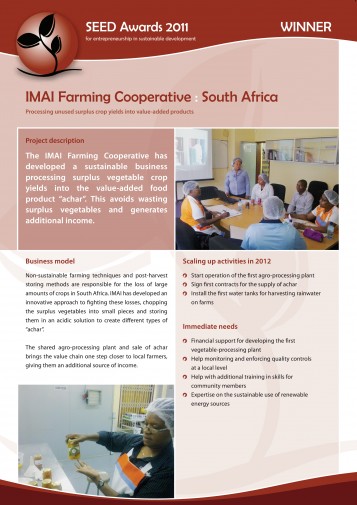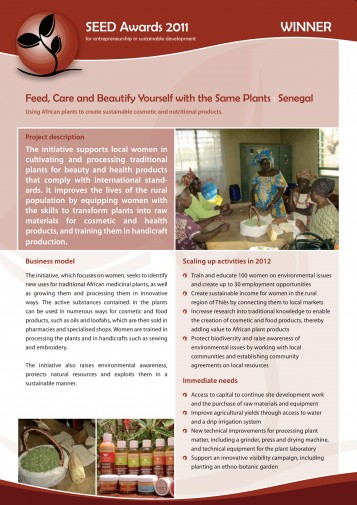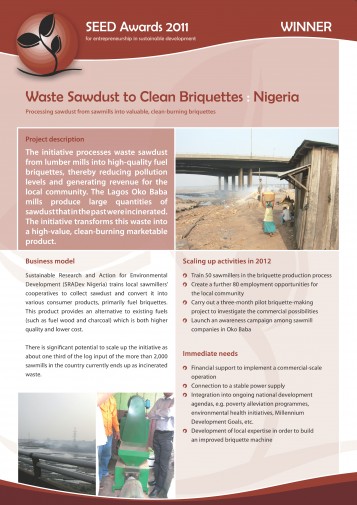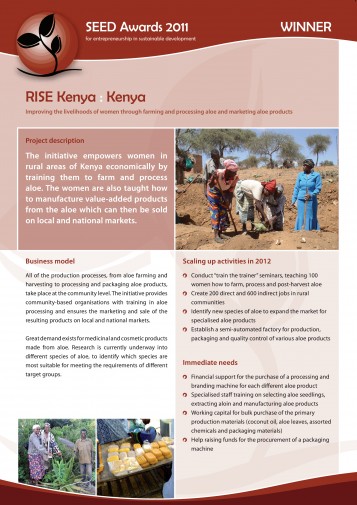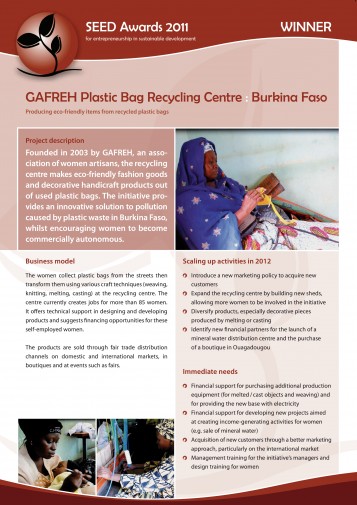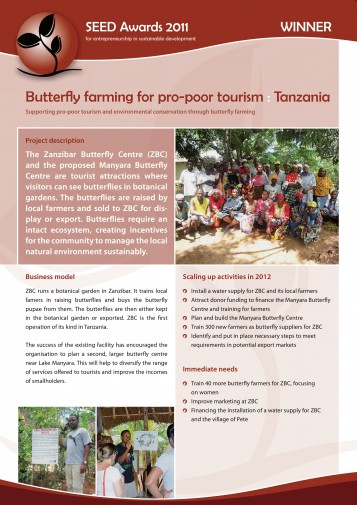Enterprise Brief: AGRIPO
Published: 30 August 2011
Tayab Eco-Orchards (TEO) improves the living conditions of the rural population in Tayab through the promotion of organic agriculture and eco-tourism. The initiative contributes to the fight against deforestation and land degradation whilst creating new income generating activities. Read more
SDGs:





Enterprise Brief: Women Environment Preservation Committee (WEPCO)
Published: 30 August 2011
The initiative seeks to enhance environmental conservation while generating income from recycled household waste, mainly in Kathmandu Valley. Women are provided with business and waste management training and access to micro-credit loans, and are encouraged to form conservation groups across the country. Read more
SDGs:







Enterprise Brief: ISOMET Sarl
Published: 30 August 2011
The “Hybrid Solar Oven” is a large capacity hybrid oven that uses solar and gas-fired power. This saves valuable wood resources and reduces emissions of greenhouse gases. The aim is to create income for the rural population by promoting the benefits of switching from wood to solar power for baking and roasting. Read more
SDGs:









Enterprise Brief: Watamu Community Solid Waste Management and Recycling Enterprises
Published: 30 August 2011
The initiative deals with solid waste pollution in Watamu Marine Park and Reserve beaches and nearby villages. By combining environmental welfare and conservation tasks with community empowerment, employment and alternative income generation, the initiative sets an example for community-based waste management. Read more
SDGs:









Enterprise Brief: Nubian Vault Association
Published: 30 August 2011
The Nubian Vault Association (Association la Voûte Nubienne, AVN) offers a global solution aimed at resolving housing problems in the Sahel zone. The solution draws on an ancestral building technique that does not use wood, sheet metal or cement, and can be mastered by skilled masons according to the local market situation. Read more
SDGs:







Enterprise Brief: Kenya Organic Finest Aromas Ltd (KOFA)
Published: 29 August 2011
The initiative seeks to address food insecurity and poverty among smallscale farmers in Kenya by providing them with certified organic farm inputs, training in organic farming techniques and marketing-related services to increase their profit margins and market access. Read more
SDGs:







Enterprise Brief: Man and Man Enterprise
Published: 29 August 2011
Man and Man Enterprise produces and markets efficient biomass cooking stoves which save 40 % on charcoal compared to conventional stoves. The product thus enables substantial savings on fuel costs while reducing deforestation and GHG emissions. Read more
SDGs:







Enterprise Brief: Karama
Published: 29 August 2011
Karama markets Egyptian handicrafts, linking marginalised artisans to the global market and highlighting the tradition and artistry that lies behind every piece. The initiative also trains artisans and encourages them to take pride in their cultural heritage, thereby ensuring that their skills are passed down through the generations. Read more
SDGs:









Enterprise Brief: GreenTech Company Ltd - fuel briquettes from groundnut shells combined with fuel efficient stoves
Published: 29 August 2011
Since July 2011, GreenTech produces high quality fuel briquettes from groundnutshells and promotes fuel efficient stoves for cooking and heating purposes in households, restaurants and industries. As the combined briquette/stove unit needs less fuel input than common cooking units, it reduces cooking costs, emissions and the exploitation of forests. The briquettes are pressed by a heavy duty machine, producing 800kg/h. The stoves are produced with recycled metal by local weldermen. Briquettes and stoves are available on stock. Read more
SDGs:







Enterprise Brief: SEPALI Madagascar
Published: 29 August 2011
SEPALI is a local spin-of of an international non-governmental organisation that provides technical and financial assistance to farmers and community-based enterprise groups in Madagascar. By promoting the production and processing of wild silk from moths raised on indigenous trees, SEPALI conserves local biodiversity and secures farmers’ livelihoods. Read more
SDGs:







Enterprise Brief: FADECO Trading Co. Ltd.
Published: 29 August 2011
The initiative tackles the problem of post-harvest losses by solar drying fruit and vegetables which can subsequently be stored or sold. Drying agricultural products helps to ensure food security during the rainy seasons and creates opportunities for local farmers to access new markets. Read more
SDGs:







Enterprise Brief: Rural Transportation and Renewable Products Conversion Centres for Agro-residues
Published: 29 August 2011
VIVUS has developed an innovative rural transportation system enabling the efficient collection of small quantities of crops and agricultural waste in remote areas. The initiative then sells the crops in urban centres and converts the residues into biogas and fertiliser. Read more
SDGs:







Enterprise Brief: Community-based, sustainable and commercially viable Aloe vera products as alternative income generation for fisherwomen in Bar Reef Special Management Area in Kalpitiya
Published: 29 August 2011
The initiative introduces householdlevel Aloe vera cultivation and processing, helping to conserve coastal resources and reduce poverty among fishing communities in Kalpitiya. Aloe vera leaves are purchased by the cosmetics industry and an Aloe vera drink can be sold locally. Read more
SDGs:









Enterprise Brief: Recycle Not A Waste Initiative – RECNOWA
Published: 29 August 2011
The Recycle Not A Waste Initiative (RECNOWA) recycles waste plastic and other waste materials into welldesigned products for daily use and fashion items. The initiative then promotes and sells the products. This creates employment and income opportunities for disadvantaged young people in the suburbs of Accra. Read more
SDGs:







Enterprise Brief: Global Bamboo Products
Published: 29 August 2011
Global Bamboo Products Ghana relieves pressure on dwindling forests through reforestation and bamboo agroforestry, producing and marketing bamboo and other non-timber forest products (NTFP), and training rural community members in handicraft production and alternative livelihood options such as bee-keeping and bamboo charcoal production. Read more
SDGs:









Enterprise Brief: BRADES
Published: 29 August 2011
The initiative provides urban and rural households with biochar briquettes made from clay and charcoal waste, a cheap combustible fuel. Read more
SDGs:





Enterprise Brief: Plastic Waste Recycling as an Alternative to Burning and Landfilling
Published: 29 August 2011
The initiative employs local people to collect, sort and recycle plastic waste. Plastic waste accounts for a significant portion of total municipal waste. By tackling this problem, the initiative provides job opportunities, improves the local environment and increases environmental awareness in the community. Read more
SDGs:







Enterprise Brief: Natural tree products and community resource management
Published: 29 August 2011
Everpix and its partners create income for rural communities by manufacturing and selling a diversified portfolio of sustainable novel products made from natural resources. Indigenous tree planting by communities and the establishment of integrated “green” business development hubs empower future growth. Read more
SDGs:







Enterprise Brief: GebRaa
Published: 29 August 2011
Using recycled materials and invasive species from the wetlands around Lake Victoria, KICK encourages local artisans to create handmade products. It also recycles wire from old fridge compressors and uses it to make unique handmade paper cards and bookmarks. Read more
SDGs:









Enterprise Brief: Imai Farming Cooperative
Published: 29 August 2011
The IMAI Farming Cooperative has developed a sustainable business processing surplus vegetable crop yields into the value-added food product “achar”. This avoids wasting surplus vegetables and generates additional income. Read more
SDGs:







Enterprise Brief: Dr Marie Dialo Labortoires
Published: 29 August 2011
The initiative supports local women in cultivating and processing traditional plants for beauty and health products that comply with international standards. It improves the lives of the rural population by equipping women with the skills to transform plants into raw materials for cosmetic and health products, and training them in handicraft production. Read more
SDGs:







Enterprise Brief: Sawdust Entrepreneurial Initiative Among Oko-baba Communities In Lagos
Published: 29 August 2011
The initiative processes waste sawdust from lumber mills into high-quality fuel briquettes, thereby reducing pollution levels and generating revenue for the local community. The Lagos Oko Baba mills produce large quantities of sawdust that in the past were incinerated. The initiative transforms this waste into a high-value, clean-burning marketable product. Read more
SDGs:







Enterprise Brief: RISE Kenya
Published: 29 August 2011
The initiative empowers women in rural areas of Kenya economically by training them to farm and process aloe. The women are also taught how to manufacture value-added products from the aloe which can then be sold on local and national markets. Read more
SDGs:







Enterprise Brief: Centre de Recyclage des Sachets Plastiques du GAFREH
Published: 29 August 2011
Founded in 2003 by GAFREH, an association of women artisans, the recycling centre makes eco-friendly fashion goods and decorative handicraft products out of used plastic bags. The initiative provides an innovative solution to pollution caused by plastic waste in Burkina Faso, whilst encouraging women to become commercially auto nomous. Read more
SDGs:







Enterprise Brief: Butterfly farming for pro poor tourism and environment conservation
Published: 29 August 2011
The Zanzibar Butterlfy Centre (ZBC) and the proposed Manyara Butterfly Centre are tourist attractions where visitors can see butterflies in botanical gardens. The butterflies are raised by local farmers and sold to ZBC for display or export. Butterflies require an intact ecosystem, creating incentives for the community to manage the local natural environment sustainably. Read more
SDGs:






